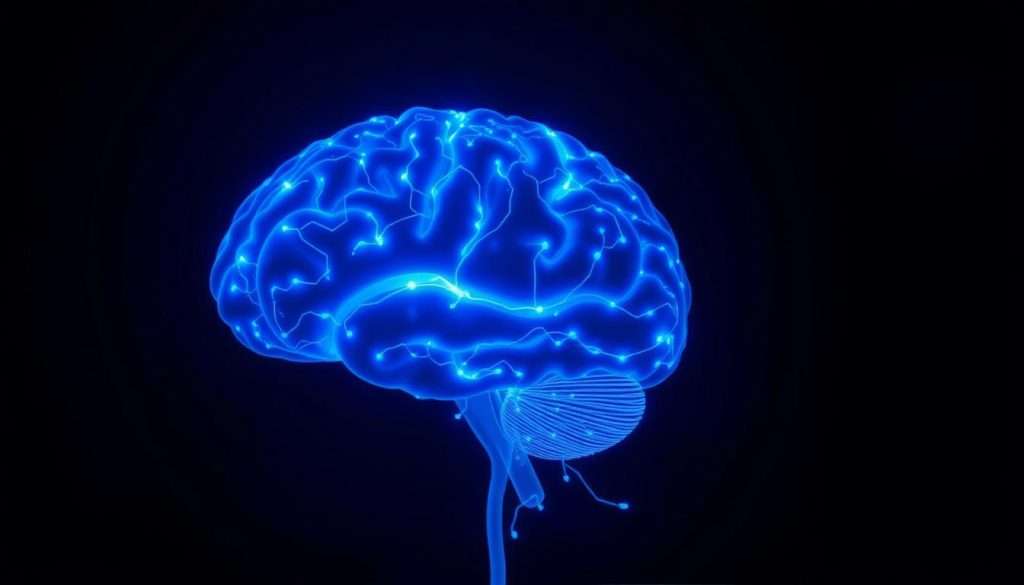Mel Robbins once said, “Your brain is the supercomputer that runs your life. If it’s not working, you’re dead—so why don’t we take better care of it?” This powerful statement shows how crucial brain health is for our daily lives.
We often forget how powerful our minds can be. With the right brain-boosting techniques, we can greatly improve our thinking skills. By adding effective cognitive enhancement tips to our daily routine, we can reach our mind’s full potential.
Imagine being able to remember everything you need to, stay focused, and learn new skills with ease. By using simple yet effective memory hacks that work, you can change how you learn and remember.
Key Takeaways
- Boost your brain health with simple, effective techniques.
- Improve cognitive function using proven cognitive enhancement tips.
- Unlock your mind’s potential with brain-boosting strategies.
- Enhance your memory and learning abilities.
- Transform your daily life by optimizing your brain’s performance.
The Science Behind Memory: Understanding How Your Brain Stores Information
Ever wondered how your brain stores and recalls so much information? Knowing how memory works is key to unlocking your mind’s full potential. Jim Kwik says, “We know that about one third of your brain’s performance… is predetermined by genetics and biology. But that means two thirds is in your direct control.” This shows we can improve our memory by understanding it better.
Short-term vs. Long-term Memory Processes
Our brain handles information in two stages: short-term and long-term memory. Short-term memory is like a temporary spot where info stays briefly before being either thrown away or moved to long-term memory. It’s like a sticky note for jotting down a phone number before adding it to your contacts. Long-term memory, however, is like a huge library where info stays for a long time.
The Role of Neuroplasticity in Memory Formation
Neuroplasticity is the brain’s ability to change by making new connections. This flexibility is key for learning and memory. When we learn new things or memorize info, our brain makes new paths. This makes it easier to remember later. It shows our brain can change, not just stay the same forever.
How Attention and Focus Impact Memory Storage
Attention and focus greatly affect what info gets stored in our long-term memory. When we’re fully focused, our brain is more likely to keep the info for a long time. But distractions can make it harder to remember things later.
| Memory Type | Characteristics | Impact on Learning |
|---|---|---|
| Short-term Memory | Temporary storage, limited capacity | Initial information processing |
| Long-term Memory | Permanent storage, vast capacity | Retention and recall of information |
By knowing how our brain stores info, we can use memory improvement strategies to boost our recall. Using mnemonics for recall can help make info more memorable.
Memory Hacks That Work: Proven Techniques for Better Recall
Unlocking your brain’s potential needs the right tools. We’re about to explore some memory hacks that really work. Improving your memory isn’t just about being more focused. It’s about using the right techniques.
The Method of Loci (Memory Palace Technique)
The Method of Loci, also known as the Memory Palace technique, is a powerful tool for memory improvement. You think about locations you’re familiar with and pair them with information you need to remember using visualization tactics.
Creating Your First Memory Palace
To create your first Memory Palace, start by visualizing a place you know well, like your home. Associate the information you want to remember with specific locations in your home. For example, if you’re trying to remember a shopping list, imagine the first item on your list at your front door.
Practice Exercises for Spatial Memory
Practice is key to mastering the Memory Palace technique. Try to recall the layout of your home or school without looking. Then, test yourself by trying to remember the items you’ve associated with each location.
Spaced Repetition Systems
Spaced repetition is a technique where you review material at increasingly longer intervals to help solidify it in your long-term memory. This method is particularly effective for learning new languages or memorizing key terms.
| Day | Review Material | Interval |
|---|---|---|
| 1 | New Vocabulary | – |
| 2 | New Vocabulary | 1 day |
| 5 | New Vocabulary | 3 days |
Chunking Information for Easier Retention
Chunking involves breaking down information into smaller, more manageable units. This technique is useful for remembering phone numbers or passwords. For example, a phone number like 1234567890 can be chunked into 123-456-7890, making it easier to recall.
By incorporating these memory hacks into your daily routine, you’ll be well on your way to improving your brain function and enhancing your memory. Whether you’re a student or just looking to boost your cognitive abilities, these techniques can make a significant difference.
The Power of Association: Linking New Information to Existing Knowledge
Creating meaningful connections between pieces of information is a great way to boost memory. Our brains are wired to remember connections. This makes association a strong tool for better recall.
Creating Meaningful Connections Between Ideas
To use association effectively, link new info to something you already know or find interesting. For example, when trying to remember a new face, think of someone you know who looks similar. This method helps keep the new info in your long-term memory.
Using Visual Imagery to Enhance Associations
Visual imagery is a powerful way to make associations stronger. By creating clear mental images that connect new info to what you already know, you can remember details better. For instance, Jim Kwik’s “SUAve” method for remembering names uses visualization, showing how association can improve memory.
Visualization Exercises for Stronger Memory
- Practice making mental images that connect new info to something familiar.
- Use all your senses to make the image more vivid and easy to remember.
- Regularly practice visualizing to make your memory stronger.
Storytelling as a Memory Enhancement Tool
Storytelling is also a great way to improve memory through association. By adding new info to a story, you make it easier to remember. Stories are more memorable than facts alone because they provide a framework for recall.
By using these association techniques every day, you can significantly enhance your memory power and improve recall. Whether through meaningful connections, visual imagery, or storytelling, association is a versatile and effective tool for improving your mind.
Mnemonic Devices: Memory Shortcuts That Stick
To boost memory, many use mnemonics, clever ways to remember. Mnemonic devices link new info to familiar things, making recall easier.
Acronyms and Acrostics for Quick Memorization
Acronyms and acrostics are top mnemonic tools. An acronym is a word from a phrase’s first letters, like SUAve for names. An acrostic is a sentence where each word’s first letter spells out what you want to remember.
Rhymes and Songs as Memory Aids
Rhymes and songs help memory too. Their melody and rhythm make info stick. For example, songs teach the alphabet or rhymes like “Thirty days hath September” to remember months with 30 days.
Number-Shape and Number-Rhyme Systems
Number-shape and number-rhyme systems link numbers to shapes or rhymes. For example, number 1 might be a candle (shape) or “bun” (rhyme).
Practical Applications for Remembering Numbers
Using the number-rhyme system is handy for PINs or passwords. Link each number to a rhyming word and create a story or image with those words.
| Mnemonic Device | Description | Example |
|---|---|---|
| Acronyms | Forming a word from initial letters | SUAve for remembering names |
| Acrostics | Creating a sentence from initial letters | “Every Good Boy Does Fine” for musical notes |
| Rhymes and Songs | Using melody and rhythm for memory | Alphabet song or “Thirty days hath September” |
Using these mnemonic devices daily can greatly improve your memory. Try different methods to see what works best for you!
Physical Optimization: How Lifestyle Affects Your Memory
Improving your memory isn’t just about using techniques. It’s also about your lifestyle. Your daily habits and choices greatly affect your brain’s memory abilities. By focusing on your physical health, you can boost your brain function and memory.
Sleep’s Critical Role in Memory Consolidation
Sleep is key for turning short-term memories into long-term ones. During sleep, your brain strengthens connections between neurons. This makes it easier to remember things later.
Optimizing Your Sleep Schedule for Better Recall
To boost your memory, aim for 7-9 hours of sleep each night. Also, keep a regular sleep schedule. This helps your brain’s internal clock and improves sleep quality.
Exercise and Its Impact on Cognitive Function
Exercise is great for your body and brain. It improves cognitive function, boosts blood flow to the brain, and helps grow new neurons.
Nutrition for Brain Health and Memory
Your diet is crucial for brain health and memory. Dr. Daniel Amen suggests eating foods like salmon, berries, nuts, seeds, leafy greens, and raw cacao. These foods are full of nutrients that support brain health.
Key Nutrients and Foods That Boost Memory
Omega-3 fatty acids in salmon, antioxidants in berries, and healthy fats in nuts and seeds are important. Adding these foods to your diet can help support your brain and improve memory.
Mindfulness and Memory: Training Your Brain to Be Present
In today’s fast world, mindfulness boosts memory and brain power. Mindfulness, like meditation, sharpens focus and memory. It trains your brain to stay in the moment.
Meditation is a key to better focus and memory. It makes you more aware of now, cutting down on distractions and improving focus.
Meditation Practices for Enhanced Focus
Meditation can be simple, like breathing exercises, or complex, like guided meditations. The goal is to find what works for you and keep at it.
Single-Tasking vs. Multi-Tasking
In our digital world, multi-tasking seems smart. But, research favors single-tasking for better memory and brain function. Focusing on one thing at a time helps you remember better.
| Task Type | Effect on Memory |
|---|---|
| Single-Tasking | Improves focus and recall |
| Multi-Tasking | Can lead to divided attention and decreased memory retention |
Mindful Learning Techniques
Mindful learning means being fully there in the learning process. The Pomodoro Technique is a great way to enhance this.
The Pomodoro Technique for Memory Enhancement
The Pomodoro Technique works in 25-minute focused blocks, followed by a 5-minute break. It keeps you sharp and helps you remember better.

Adding mindfulness and meditation to your day boosts brain function and memory. Mix these with cognitive enhancement tips and memory enhancement tricks for the best results.
Digital Tools and Apps for Memory Enhancement
In today’s digital age, using technology can really boost our memory. There are many apps and tools out there. You can pick the ones that match your learning style and goals.
Spaced Repetition Software and Flashcard Systems
Spaced repetition software, like Anki, is very popular. It helps you learn and remember better. It works by reviewing material at longer intervals, helping it stick in your long-term memory. It’s great for language learners and students.
Note-Taking Applications That Enhance Recall
Note-taking apps like Evernote and OneNote do more than just take notes. They help you remember better. You can organize your notes and use tags or notebooks to find what you need fast. Some apps even let you record audio and take photos to help your memory.
Brain Training Games: What Works and What Doesn’t
Brain training games claim to improve memory. Some games, like Lumosity, are fun and offer exercises. But, it’s important to be careful. Look for games that have scientific backing and avoid those that make too many promises.
Using these digital tools every day can help you improve your memory. Whether it’s through spaced repetition, organized note-taking, or brain training, technology can be a big help. It can make your memory better.
Overcoming Memory Obstacles: Strategies for Common Challenges
Memory obstacles are a common experience, but with the right strategies, you can overcome them and unlock your full potential. We face various memory challenges daily, from remembering names and faces to managing information overload.
Techniques for Remembering Names and Faces
One effective method for remembering names and faces is Jim Kwik’s “SUAve” technique. It involves saying the name, using it, asking about it, visualizing, and ending with it. This simple yet powerful technique can be applied in various social situations.
The Name-Face Association Method
The Name-Face Association Method involves associating a person’s name with their face, creating a mental link between the two. You can achieve this by repeating the name, visualizing a word or image related to the name, or linking it to someone else you know with the same name.
Managing Information Overload
In today’s information age, managing information overload is crucial. Techniques like chunking, where you break down information into smaller, manageable chunks, and using mnemonic devices can help. You can also prioritize information, focusing on the most critical details.
Strategies for Age-Related Memory Concerns
As we age, memory concerns can become more pronounced. Engaging in regular physical exercise, maintaining a balanced diet, and staying mentally active can help mitigate these effects. Additionally, using memory aids like calendars, reminders, and notes can support your memory.

By implementing these strategies, you can overcome common memory obstacles and enhance your cognitive abilities. Remember, the key is to find what works best for you and practice consistently.
Implementing Memory Hacks in Daily Life: A 30-Day Plan
To unlock your mind’s full potential, we need to practice memory hacks. Our 30-day plan will guide you. Just a few minutes each day can boost your memory and brain power.
Week 1: Foundation Building Exercises
In the first week, you’ll start your memory journey. You’ll do simple yet effective exercises to begin.
Daily Practice Routines (10-15 Minutes)
Start with short daily sessions. As you get used to it, increase the time. For example, begin with:
- 5 minutes of meditation to improve focus
- 5 minutes of memory games or puzzles
- 5 minutes of reviewing and summarizing what you’ve learned
Week 2-3: Technique Integration and Practice
In weeks 2 and 3, you’ll add more advanced techniques to your routine. This includes:
- The Method of Loci (Memory Palace Technique)
- Spaced Repetition Systems
- Chunking Information for Easier Retention
Week 4: Assessment and Customization
By week 4, you’ll know what works for you. It’s time to check your progress and tailor your approach.
Measuring Your Progress and Adjusting Methods
Reflect on your journey. Ask yourself:
“What techniques have been most effective for me? Where do I still struggle?”
Use this insight to tweak your daily routines. Focus on the methods that work best for you.
| Week | Focus | Techniques |
|---|---|---|
| 1 | Foundation Building | Daily practice routines |
| 2-3 | Technique Integration | Method of Loci, Spaced Repetition, Chunking |
| 4 | Assessment and Customization | Reflecting on progress, adjusting methods |
By following this 30-day plan, you’ll improve your memory and learn better. Stay consistent, and you’ll see the results!
Conclusion: Your Journey to Enhanced Memory and Cognitive Performance
We’ve looked at many ways to boost your brain. You can learn how your brain works and use tricks like the Method of Loci. This helps you remember better.
Using these methods every day is important. By adding physical exercise, mindfulness, and digital tools to your routine, you’ll see big improvements. You can make your brain stronger with easy, effective methods that work for you.
Begin your 30-day plan today and see how your memory and thinking skills improve. With dedication and the right methods, you’ll reach your goals and become sharper. Start improving your brain function and take charge of your mental health today!

